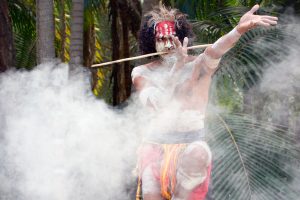On a yet to be announced date this year, Australia will hold a referendum to recognize the country’s First Nations peoples in the constitution, and establish a national Indigenous advisory body to be known as the Aboriginal and Torres Strait Islander Voice. This body would make representations to the parliament on issues concerning First Nations people, but their recommendations would not be binding. A referendum is required to make the body a permanent feature of Australian governance, and to give great weight and appreciation to the 60,000 years of First Nations presence on the Australian continent.
The idea for the referendum was born from a series of dialogues held by First Nations groups held across the country, which funneled into a national convention held at Uluru in 2017. The document born from this convention – The Uluru Statement From The Heart – was a generous outreach to the broader Australian public to understand the deep spiritual connection to the Australian landmass that First Nations people have, and to address the structural issues that continue to negatively affect First Nations people – “…the torment of our powerlessness,” as the statement aptly describes.
The Uluru Statement From The Heart advocated for the establishment of a Voice to Parliament as a mechanism to overcome this torment. The idea was initially rejected by the Liberal/National coalition government of the day; however, it was embraced by the then-opposition Labor Party, which after winning office in May of last year committed to holding the referendum in its first term. The legislation authorizing the referendum passed both houses of parliament on June 19 this year, giving the referendum between two and six months to be held.
For a referendum to pass in Australia it must achieve not just a majority of the national vote, but a majority in four of the six states. Given the large discrepancies in population between states, this means a referendum might easily pass the first hurdle, but fall short with the second. Five times previously in Australia’s history a referendum question has won a majority of the national vote, but been rejected by at least three states.
When referendums have been successful in Australia’s past – only eight of the 44 held since federation in 1901 have passed – they have come with cross-party support from the major parties of the day. Unfortunately, this referendum doesn’t have this support. Both the Liberal and the National parties (and the Liberal National Party in Queensland) have decided to oppose the proposition.
The Liberal Party is arguing that the Voice to Parliament would give one racial group greater rights than others – a perspective that willfully ignores that the body would advise on issues solely concerning First Nations people, and that strict neutrality often fails to overcome massive imbalances of power.
Due to the current unpopularity of the Liberal Party – and its apparent desire to actively make itself as unpopular as possible – their position may not be terminal for the proposition, yet the party still has the ability to influence a significant number of the country’s population, making the vote a fraught one.
Referendums often carry great risks. Because they are dealing with constitutional issues, their impact can extend beyond general governance. Some referendums in Australia’s past have concerned merely procedural issues – ways to overcome issues that the constitution’s framers couldn’t have foreseen – but other have far greater reach and speak to the soul of the country.
This is one such referendum, and given it concerns some of Australia’s most disadvantaged groups a negative result will have major ramifications for not just First Nations groups – who may rightly feel that they are being silenced and sidelined – but also it may signal a disinterest within the broader Australian public to address poor outcomes and structural inequalities within the country. However, a positive response to the referendum question will symbolize that the country is capable of acknowledging the brutalities of the past and the persistent disparities that have flowed on from this for First Nations peoples, and a desire to find methods to rectify these.
There are also critical ramifications for Australia’s international reputation. As Ambika Vishwanath wrote in The Interpreter last week: “A ‘No’ vote from Australia would call into question the authenticity of its words and actions abroad at a time when authoritarian regimes present themselves as the vanguard of a shift away from ‘liberal internationalism.’”
For Australia to be a credible and positive international actor, it needs to be seen to be seriously addressing its own internal problems. This is not only about being seen as a liberal democracy worth emulating, but goes to the heart of how it conducts itself as a development partner within its immediate region. In particular neighboring Pacific Island countries – who have forged strong bonds with Australia’s First Nations people – will find a no vote to be disheartening and of negative consequence to the ideals of the “Pacific Family.”

































